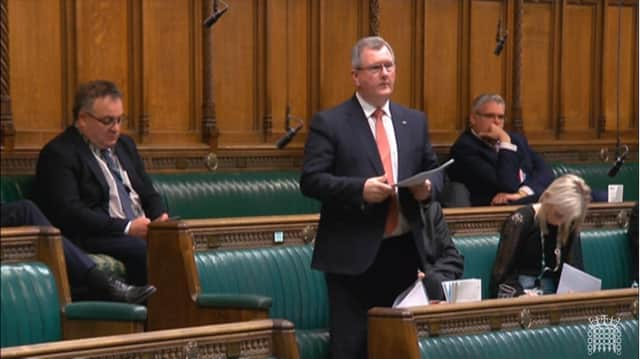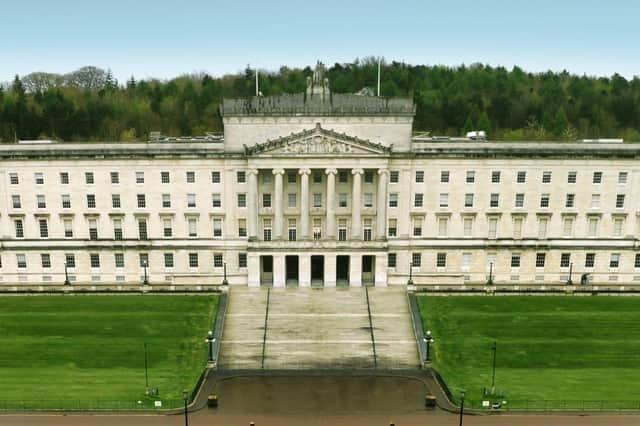DUP to disrupt new EU law which would 'increase checks' on the Irish Sea border


The DUP leader says it is part of legal protections the party has secured, preventing the Government from automatically adding new EU rules in the absence of cross-community consent.
The party says the proposed new EU law would substantially expand EU intellectual property legislation in Northern Ireland – and cause added checks between Great Britain and Northern Ireland.
Advertisement
Hide AdAdvertisement
Hide AdSir Jeffrey told the News Letter that the law is “not only harmful to our economy but a threat to the United Kingdom internal market as a whole”.


Since the Northern Ireland Protocol and Windsor Framework were agreed between the UK and EU, certain EU laws continue to apply in Northern Ireland.
The mechanism the DUP intend to use is separate to the much-talked-about Stormont Brake, which only applies to changes to existing EU law. The DUP move is under an ‘applicability motion’ – and will be debated on Tuesday.
Under the Protocol, the UK government must first approve new laws the EU wants to apply to Northern Ireland – but if they don’t, there can be retaliatory action by the EU.
Advertisement
Hide AdAdvertisement
Hide AdThe ‘applicability motion’ – a mechanism brought in under the Windsor Framework – requires cross-community consent for new EU laws at the Assembly. It is effectively a unionist or nationalist veto – but only at Stormont level. Local politicians can’t stop the new law – but can ask the UK government to stop it.
However, the government can decide to proceed with it if it feels it doesn’t create a ‘new regulatory border’ within the UK – or ‘materially divert trade’ or ‘materially impair the free flow of goods’. The EU also retains the ability to take ‘appropriate remedial measures’ and take ‘any necessary decision’ in response to the law being blocked.
The DUP clearly believe that this law would create a new regulatory border.
When new EU law comes before the Assembly, the DUP says that the expectation is that is brought “in the affirmative” – ie a motion in favour – and that’s what the party will do.
Advertisement
Hide AdAdvertisement
Hide AdHowever, Sir Jeffrey says “there is no doubt about our motivation. It is only a means to an end. We will vote decisively against the motion and against the imposition of this EU regulation.”
The party leader continued: “Throughout our negotiations the DUP made it a key objective to tackle the democratic deficit created by the Protocol. Our opponents claimed this would be impossible, yet the new arrangements we have secured from the Government give local elected representatives a say on whether new EU rules and regulations should apply in Northern Ireland.
"Dynamic Alignment has ended. In what represented tangible and meaningful change to the Northern Ireland Protocol under the Stormont Brake, changed EU regulations will also no longer automatically apply in Northern Ireland.
“Additionally the legal position with respect to new areas of EU law is clear. The UK Government can only add this new EU regulation to the scope of the Framework with the express consent of both unionists and nationalists voting in the Assembly.
Advertisement
Hide AdAdvertisement
Hide Ad"However, we are not willing to contemplate a situation in which political forces in Dublin and Brussels can use the silence of the Assembly on this or any other piece of EU law to exert pressure on the Government at Westminster to abandon the principle of cross-community consensus.”
Sir Jeffrey added: “This is a watershed moment. A decision by the Assembly to withhold consent for this new EU rule will practically demonstrate that we have removed the democratic deficit within our devolved context.
“I respectfully disagree with those who feel the progress we achieved to date does not go far enough to restore our place in the United Kingdom. Had Unionism not banked the gains the DUP has achieved in the past two years and more, the reality is that this act would have been foisted on Northern Ireland with absolutely no role whatsoever for those who are democratically elected to our devolved institutions. No vote and no say.
“That is the path to the further erosion of our interests. Under the arrangements we have insisted on, and which we are now triggering, Unionists will no longer will be powerless when it comes to preventing the application of EU law that is damaging to their economic rights within the UK. That can only be positive development.
Advertisement
Hide AdAdvertisement
Hide Ad“We trust that others will join us in using this democratic mechanism and vote against this new EU measure to demonstrate opposition to it being applied in Northern Ireland thus ensuring the protection of our ability to trade with the rest of the UK”
It is clear since Stormont’s return that the potential impact of new EU laws is causing concern in certain areas across party lines. Issue coming down the line include an EU ‘carbon border’ law which could create new regulatory barriers – and this week the issue of an EU ban on dental amalgam sparked concerns for the future of the dental industry here.
Comment Guidelines
National World encourages reader discussion on our stories. User feedback, insights and back-and-forth exchanges add a rich layer of context to reporting. Please review our Community Guidelines before commenting.